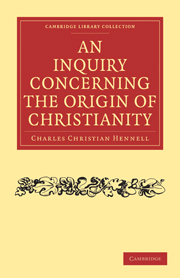Book contents
- Frontmatter
- PREFACE
- Contents
- ERRATA
- CHAPTER I Historical sketch, from the Babylonish captivity to the death of Jesus
- CHAPTER II Historical sketch, continued to the end of the first century
- CHAPTER III On the date and credibility of the Gospel of Matthew
- CHAPTER IV On the date and credibility of the Gospel of Mark
- CHAPTER V On the date and credibility of the Gospel of Luke
- CHAPTER VI On the date and credibility of the Gospel of John
- CHAPTER VII Examination of the accounts of the Resurrection and Ascension
- CHAPTER VIII Remarks on the other miracles in the four Gospels
- CHAPTER IX General objections to the miracles of Jesus
- CHAPTER X Remarks on the miracles in the Acts of the Apostles
- CHAPTER XI On the evidence afforded to the miracles by the apostolic writings
- CHAPTER XII On the prophecies
- CHAPTER XIII On the parts of Isaiah supposed to relate to Christ
- CHAPTER XIV On the book of Daniel
- CHAPTER XV Whether Jesus foretold his own death and resurrection
- CHAPTER XVI On the character, views, and doctrine of Jesus
- CHAPTER XVII Comparison of the precepts of Jesus with the Jewish writings
- CHAPTER XVIII Concluding reflections
- APPENDIX
CHAPTER XIV - On the book of Daniel
Published online by Cambridge University Press: 05 March 2012
- Frontmatter
- PREFACE
- Contents
- ERRATA
- CHAPTER I Historical sketch, from the Babylonish captivity to the death of Jesus
- CHAPTER II Historical sketch, continued to the end of the first century
- CHAPTER III On the date and credibility of the Gospel of Matthew
- CHAPTER IV On the date and credibility of the Gospel of Mark
- CHAPTER V On the date and credibility of the Gospel of Luke
- CHAPTER VI On the date and credibility of the Gospel of John
- CHAPTER VII Examination of the accounts of the Resurrection and Ascension
- CHAPTER VIII Remarks on the other miracles in the four Gospels
- CHAPTER IX General objections to the miracles of Jesus
- CHAPTER X Remarks on the miracles in the Acts of the Apostles
- CHAPTER XI On the evidence afforded to the miracles by the apostolic writings
- CHAPTER XII On the prophecies
- CHAPTER XIII On the parts of Isaiah supposed to relate to Christ
- CHAPTER XIV On the book of Daniel
- CHAPTER XV Whether Jesus foretold his own death and resurrection
- CHAPTER XVI On the character, views, and doctrine of Jesus
- CHAPTER XVII Comparison of the precepts of Jesus with the Jewish writings
- CHAPTER XVIII Concluding reflections
- APPENDIX
Summary
In the eighth chapter of Daniel there is an account of a vision of a ram with two horns, which was smitten by a he-goat, having a notable horn between his eyes, which horn being broken, four other notable horns came up, toward the four winds of heaven. The chapter itself informs us that by this was meant, the conquest of the kings or kingdoms of Media and Persia by the king of Grecia; the first great horn being the first king, viz. Alexander the Great, and the four notable horns after him four kingdoms which “shall stand up out of the nation, but not in his power;” i. e. plainly the four Macedonian monarchies of Thrace, Macedon, Syria, and Egypt.
So far the vision is clear, and commentators agree. But Daniel sees coming out of the four notable horns, a little horn, which plays a very conspicuous part; and to determine who the little horn is, forms the great problem of the book of Daniel. Josephus understood it to mean Antiochus Epiphanes; according to Jerome, it was Antiochus as a type of Anti-christ; Sir Isaac Newton thought that it meant the Romans; Bishop Newton, that it meant first the Romans, and afterwards the popes.
The matter is so far important, that on the meaning of the little horn depends mainly the prophetic character of the book of Daniel; i. e. whether it really contains the description of any events which happened after the time when it was written; and also whether the writers of the New Testament have made Jesus Christ apply correctly several passages from Daniel.
- Type
- Chapter
- Information
- An Inquiry Concerning the Origin of Christianity , pp. 261 - 290Publisher: Cambridge University PressPrint publication year: 2010First published in: 1838



